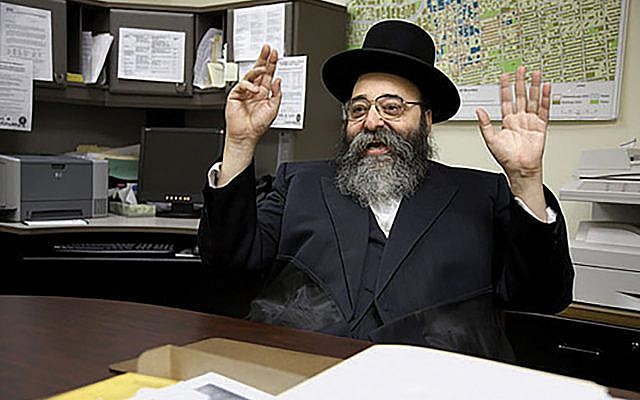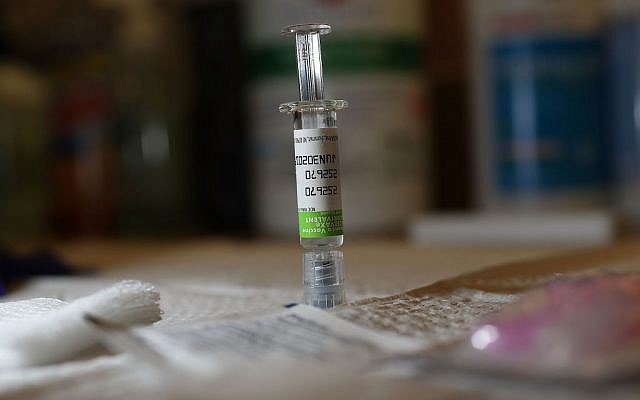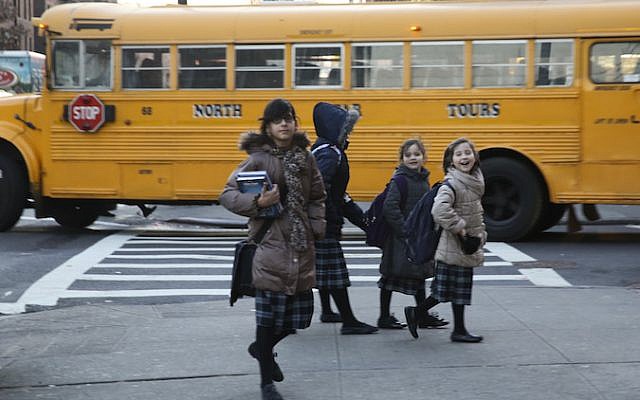Health Department Launches Outreach Campaign Amid Orthodox Measles Outbreak
Following an uptick in measles cases in charedi areas, city officials and community leaders are cooperating on vaccination-awareness campaign.
It took a measles epidemic to change the perceived dynamic
between city officials and Brooklyn’s ultra-Orthodox community, at least
for now.
The central narrative over the last few years has pitted city education officials together with a small band of former yeshiva students who are challenging yeshivas to follow state law and offer a more rigorous secular education for their students.
Charedi leaders in Brooklyn have cried foul, citing an infringement on their religious liberty and claiming that the secular education they offer is good enough for their community. That contentious dynamic was also at play a few years earlier in the battle over a controversial circumcision technique favored by many in Brooklyn’s charedi precincts; city officials argued that metzitzeh b’peh was a danger to infants while charedi leaders thought attempts to regulate it breached their religious rights.
Now, following a rash of measles infections in Brooklyn yeshivas, city officials quietly sent a letter to yeshiva principals in Williamsburg, Borough Park and surrounding neighborhoods announcing that children who aren’t vaccinated for the disease are no longer allowed to go to school.
Even though some of the ads in Orthodox papers urging parents to vaccinate their children were poorly translated into Yiddish, according to a community leader, the response has been a far cry from recent controversies.

Rabbi David Niederman, executive director and president of the United Jewish Organizations of Williamsburg, said the community and the city are working closely together “to figure out how to stem the outbreak.”
“Eradicating measles is the community and the DOH’s [Department of
Health’s] central concern,” Rabbi David Niederman, executive director
and president of the United Jewish Organizations of Williamsburg, told
The Jewish Week in an email. “For many months we have been actively
working with the yeshivas and DOH to ensure parents understand the need
to get their kids immunized. We are redoubling our efforts to put an end
to this terrible outbreak. We have educated the schools on the serious
dangers of measles and brought them together with the DOH to figure out
how to stem the outbreak.”
A New York State law requiring every public and private school student to be vaccinated has long been on the books, but some schools enforce it better than others. Since measles, mumps and rubella have nearly been eliminated in the United States, the decision by a small minority of parents not to vaccinate is usually not a problem. But the diseases are still common in other parts of the world, and currently Israel is experiencing an outbreak that, as of Sunday, has sickened 1,334 people. One toddler in Israel has died from the disease. Orthodox Jews here travel to Israel regularly, and city officials believe that is how the disease was introduced here.
While the vast majority of yeshiva students are vaccinated — a search of New York State vaccine rate records had nearly all Brooklyn yeshivas sampled well above 90 percent — there has been a growing movement against vaccination, led, among the New York-area charedi set, by an organization called PEACH, Parents Educating and Advocating for Children’s Health. PEACH tries to stay under the radar. It has no website, save for a PDF version of their 40-page booklet entitled “The Vaccine Safety Handbook: An Informed Parent’s Guide.” The booklet includes two email addresses, messages to which had not yet been returned as of press time. It also has a list of editors, but notes that some of the names listed are pseudonyms. (The Jewish Week hasn’t received a response to a request for comment from either address.)
But the area’s charedi communities vaccinate at a much higher rate than other tiny subcultures in the city. A sampling of area progressive schools and yeshivas, found 13 progressive-leaning schools and one yeshiva with vaccination rates below 95 percent. Yeshiva Bnos Spinka Boys School had a vaccination rate of 90.1 percent. The 13 progressive schools ranged from Manhattan Country School, with a rate of 94.7 percent to Brooklyn Free School with a vaccination rate of 61.8 percent. The 13 progressive schools ranged from Manhattan Country School, with a rate of 94.7 percent to Brooklyn Free School with a vaccination rate of 61.8 percent. The other schools’ vaccination percentages are as follows: Bushwick School For Social Justice (92.8), Brooklyn Heights Montessori School (92.6), Greene Hill (90.3), The Studio School (90.2), Special Music School (90.0), Windmill Montessori (85.9), Progressive School Of Long Island (83.1), The Blue School (76.6), Brooklyn Waldorf School (71.4) and Sarah Lawrence Early Childhood Center (66.7).
While non-yeshivas have some of the lowest vaccination rates in the city, most people don’t mind the city targeting yeshivas for enforcement of the rule excluding unvaccinated children from school, community leaders said.
“I believe a number of the schools had already adopted the exclusion policy even prior to the Health Department’s directive, and I believe that there has been broad compliance after its publication. For now, at least, I think there have been only a small number of complaints about the exclusive focus on Jewish schools,” said Rabbi David Zwiebel, executive vice president of Agudath Israel of America, an umbrella organization for charedi Jews.
Alexander Rapaport, the co-founder and CEO of the Masbia Soup Kitchen Network in Brooklyn, who often acts as a liaison from the Borough Park chasidic community, said he’s not surprised that the current measles outbreak has stayed limited to the charedi community, given an insular nature so strong, that the measles epidemic is spreading from Israel to Brooklyn before it will spread to someone outside of the community. Calling the phenomenon akin to the community having “invisible ghetto walls” around communities and “invisible bridges” connecting them with each other, he said: “We keep to ourselves to the extent that a cotangent will spread to Rockland before it spreads to the person next door. It’s the most stark real-life gauge of how we keep to ourselves.”
While community members don’t seem to mind the exclusive focus on unvaccinated yeshiva students, that doesn’t mean the move would necessarily pass muster if legally challenged, said Mark Stern, general counsel of the Jewish advocacy group AJC. While on the one hand, it makes sense to limit the rule to yeshivas because they are the only schools that have students coming down with measles, “the drawing of religious lines comes with a very heavy burden of unconstitutionality,” he said in a telephone interview. “I don’t mean to say that it’s clearly illegal, but it’s at least eyebrow raising.”
“The overwhelming majority of the Williamsburg community vaccinates their children.
Unfortunately, the anti-vaccine movement that effects the broader public has its supporters in the Jewish community as well and that is why we see a small part of the community not vaccinating,” Rabbi Niederman told The Jewish Week via email.

He said he thinks the cooperation between the government and the charedi community is working.
“I know according to the DOH the numbers of those choosing to vaccinate in Williamsburg have gone up since the outbreak started and that is because the minority of people that were not vaccinating are educating themselves on the importance of having their kids vaccinated,” Rabbi Niederman wrote.
Rabbi Zwiebel agreed that charedi Jews are choosing not to vaccinate for the same alleged-but-now-debunked health risks.
Both the city and state health departments have made a concerted effort to reach out to charedi communities, making sure they know about the epidemic and urging people to get vaccinated. City health officials have put ads on targeted social media sites, distributed posters, sent information materials home to parents through yeshivas, asked doctors to make sure their patients are up-to-date on shots, placed targeted Yiddish robocalls to 70,000 households and placed Yiddish and English ads in eight newspapers, seven of which were Jewish and five of which are written in Yiddish, a health department spokesman said.
State health officials have also been advertising, placing a full-page ad in both English and Yiddish in the well-respected Ami Magazine. Rapaport praised health officials for the extensive outreach, and said he hopes that next time the state uses a native Yiddish speaker to translate the materials.
“They’re trying to convince people who are still convincible,” he said in a telephone interview. “And so you need to have something that’s convincing. … If you look like you don’t know what you’re doing, how are you going to convince someone that you know what you’re talking about on medical issues.”
https://jewishweek.timesofisrael.com/measles-lowers-charedi-city-temperature/The central narrative over the last few years has pitted city education officials together with a small band of former yeshiva students who are challenging yeshivas to follow state law and offer a more rigorous secular education for their students.
Charedi leaders in Brooklyn have cried foul, citing an infringement on their religious liberty and claiming that the secular education they offer is good enough for their community. That contentious dynamic was also at play a few years earlier in the battle over a controversial circumcision technique favored by many in Brooklyn’s charedi precincts; city officials argued that metzitzeh b’peh was a danger to infants while charedi leaders thought attempts to regulate it breached their religious rights.
Now, following a rash of measles infections in Brooklyn yeshivas, city officials quietly sent a letter to yeshiva principals in Williamsburg, Borough Park and surrounding neighborhoods announcing that children who aren’t vaccinated for the disease are no longer allowed to go to school.
Even though some of the ads in Orthodox papers urging parents to vaccinate their children were poorly translated into Yiddish, according to a community leader, the response has been a far cry from recent controversies.

Rabbi David Niederman, executive director and president of the United Jewish Organizations of Williamsburg, said the community and the city are working closely together “to figure out how to stem the outbreak.”
A New York State law requiring every public and private school student to be vaccinated has long been on the books, but some schools enforce it better than others. Since measles, mumps and rubella have nearly been eliminated in the United States, the decision by a small minority of parents not to vaccinate is usually not a problem. But the diseases are still common in other parts of the world, and currently Israel is experiencing an outbreak that, as of Sunday, has sickened 1,334 people. One toddler in Israel has died from the disease. Orthodox Jews here travel to Israel regularly, and city officials believe that is how the disease was introduced here.
We are redoubling our efforts to put an end to this terrible outbreak.In Brooklyn, 39 children in the heavily Orthodox neighborhoods of Williamsburg and Borough Park have been hit with measles as of Dec. 5. In Rockland County, 91 children, teens and adults have come down with the disease as of Monday, and eight more people are being tested for the disease. In the Lakewood area of New Jersey, which has a significant charedi population, 18 people had been diagnosed with measles as of Sunday. So far no measles cases have been reported in Crown Heights, which is also chasidic, but not strongly connected to the communities in Williamsburg and Borough Park. And so far nobody in the U.S. has died of measles in the current outbreak.
While the vast majority of yeshiva students are vaccinated — a search of New York State vaccine rate records had nearly all Brooklyn yeshivas sampled well above 90 percent — there has been a growing movement against vaccination, led, among the New York-area charedi set, by an organization called PEACH, Parents Educating and Advocating for Children’s Health. PEACH tries to stay under the radar. It has no website, save for a PDF version of their 40-page booklet entitled “The Vaccine Safety Handbook: An Informed Parent’s Guide.” The booklet includes two email addresses, messages to which had not yet been returned as of press time. It also has a list of editors, but notes that some of the names listed are pseudonyms. (The Jewish Week hasn’t received a response to a request for comment from either address.)
But the area’s charedi communities vaccinate at a much higher rate than other tiny subcultures in the city. A sampling of area progressive schools and yeshivas, found 13 progressive-leaning schools and one yeshiva with vaccination rates below 95 percent. Yeshiva Bnos Spinka Boys School had a vaccination rate of 90.1 percent. The 13 progressive schools ranged from Manhattan Country School, with a rate of 94.7 percent to Brooklyn Free School with a vaccination rate of 61.8 percent. The 13 progressive schools ranged from Manhattan Country School, with a rate of 94.7 percent to Brooklyn Free School with a vaccination rate of 61.8 percent. The other schools’ vaccination percentages are as follows: Bushwick School For Social Justice (92.8), Brooklyn Heights Montessori School (92.6), Greene Hill (90.3), The Studio School (90.2), Special Music School (90.0), Windmill Montessori (85.9), Progressive School Of Long Island (83.1), The Blue School (76.6), Brooklyn Waldorf School (71.4) and Sarah Lawrence Early Childhood Center (66.7).
While non-yeshivas have some of the lowest vaccination rates in the city, most people don’t mind the city targeting yeshivas for enforcement of the rule excluding unvaccinated children from school, community leaders said.
“I believe a number of the schools had already adopted the exclusion policy even prior to the Health Department’s directive, and I believe that there has been broad compliance after its publication. For now, at least, I think there have been only a small number of complaints about the exclusive focus on Jewish schools,” said Rabbi David Zwiebel, executive vice president of Agudath Israel of America, an umbrella organization for charedi Jews.
Alexander Rapaport, the co-founder and CEO of the Masbia Soup Kitchen Network in Brooklyn, who often acts as a liaison from the Borough Park chasidic community, said he’s not surprised that the current measles outbreak has stayed limited to the charedi community, given an insular nature so strong, that the measles epidemic is spreading from Israel to Brooklyn before it will spread to someone outside of the community. Calling the phenomenon akin to the community having “invisible ghetto walls” around communities and “invisible bridges” connecting them with each other, he said: “We keep to ourselves to the extent that a cotangent will spread to Rockland before it spreads to the person next door. It’s the most stark real-life gauge of how we keep to ourselves.”
While community members don’t seem to mind the exclusive focus on unvaccinated yeshiva students, that doesn’t mean the move would necessarily pass muster if legally challenged, said Mark Stern, general counsel of the Jewish advocacy group AJC. While on the one hand, it makes sense to limit the rule to yeshivas because they are the only schools that have students coming down with measles, “the drawing of religious lines comes with a very heavy burden of unconstitutionality,” he said in a telephone interview. “I don’t mean to say that it’s clearly illegal, but it’s at least eyebrow raising.”
“The overwhelming majority of the Williamsburg community vaccinates their children.
Unfortunately, the anti-vaccine movement that effects the broader public has its supporters in the Jewish community as well and that is why we see a small part of the community not vaccinating,” Rabbi Niederman told The Jewish Week via email.

“I know according to the DOH the numbers of those choosing to vaccinate in Williamsburg have gone up since the outbreak started and that is because the minority of people that were not vaccinating are educating themselves on the importance of having their kids vaccinated,” Rabbi Niederman wrote.
Rabbi Zwiebel agreed that charedi Jews are choosing not to vaccinate for the same alleged-but-now-debunked health risks.
Both the city and state health departments have made a concerted effort to reach out to charedi communities, making sure they know about the epidemic and urging people to get vaccinated. City health officials have put ads on targeted social media sites, distributed posters, sent information materials home to parents through yeshivas, asked doctors to make sure their patients are up-to-date on shots, placed targeted Yiddish robocalls to 70,000 households and placed Yiddish and English ads in eight newspapers, seven of which were Jewish and five of which are written in Yiddish, a health department spokesman said.
State health officials have also been advertising, placing a full-page ad in both English and Yiddish in the well-respected Ami Magazine. Rapaport praised health officials for the extensive outreach, and said he hopes that next time the state uses a native Yiddish speaker to translate the materials.
They’re trying to convince people who are still convincible.In the Ami Magazine ad, for example, the English text: “Measles is spreading in our community. It can be dangerous for anyone who is not vaccinated. Protect yourself and your family. Talk to your health care provider,” was translated as “Measles is spreading in our land. It can be terrible for anyone who is not vaccinated. Protect yourself and your family. Talk to your food provider,” he said.
“They’re trying to convince people who are still convincible,” he said in a telephone interview. “And so you need to have something that’s convincing. … If you look like you don’t know what you’re doing, how are you going to convince someone that you know what you’re talking about on medical issues.”
 |
| SIGNATORIES - RABBIS SHMUEL KAMENETZKY, KOTLER, SALOMON - ALL PART OF THE AGUDATH ISRAEL RABBINICAL LEADERSHIP |
